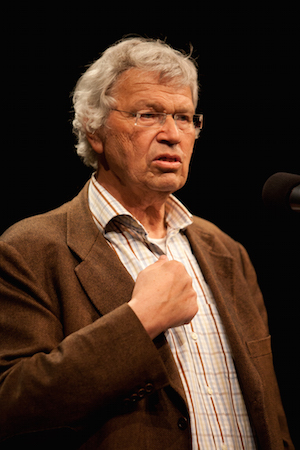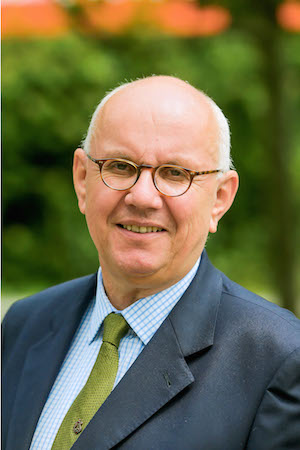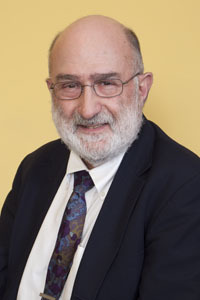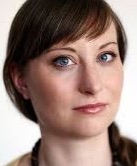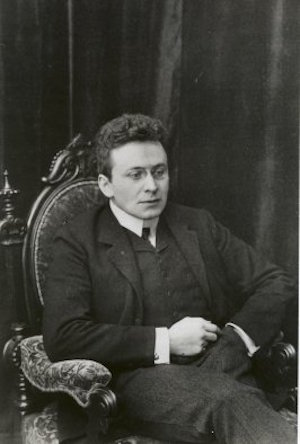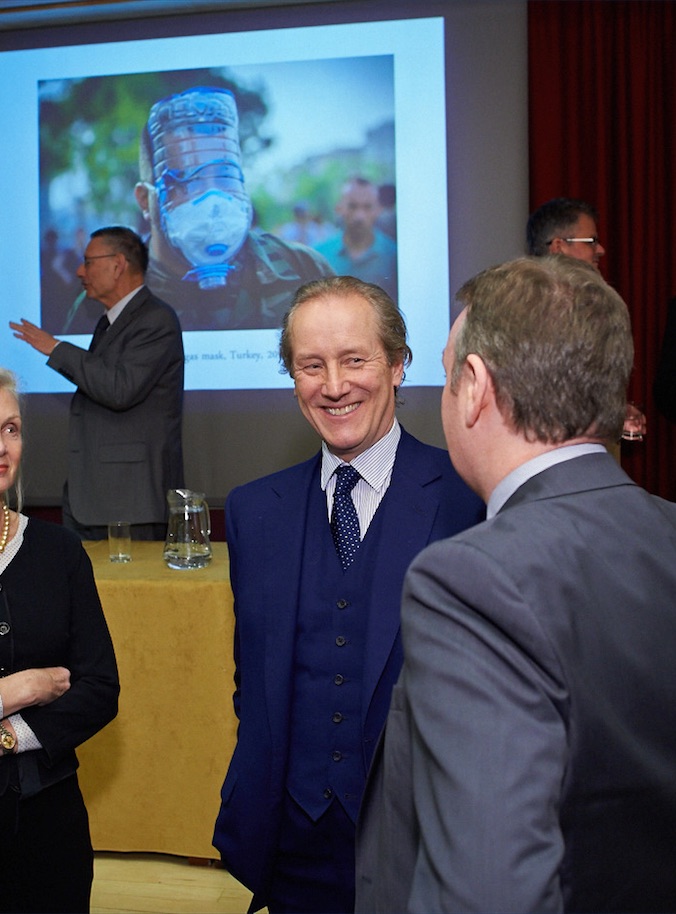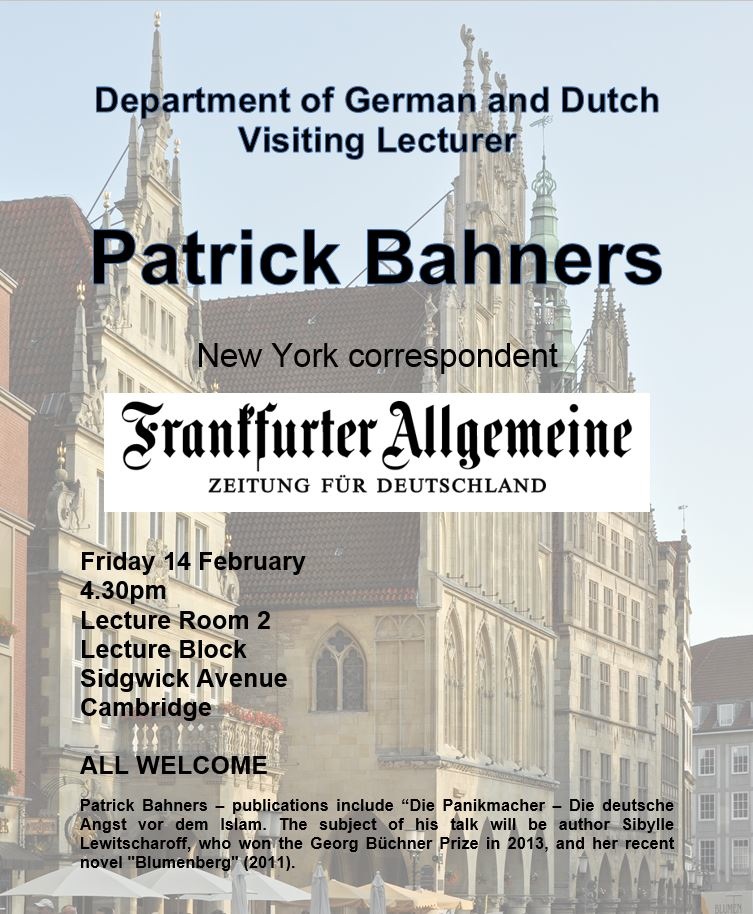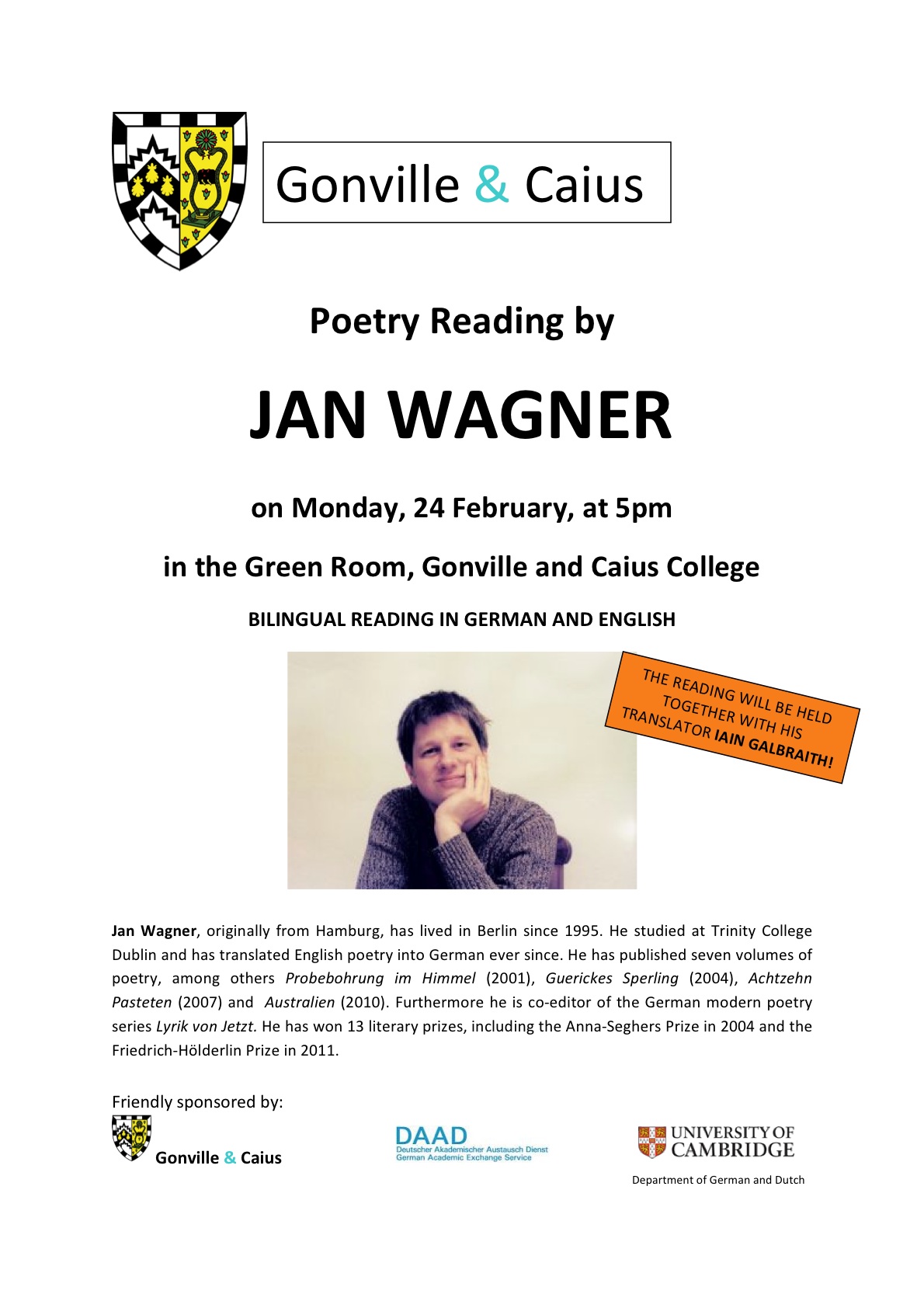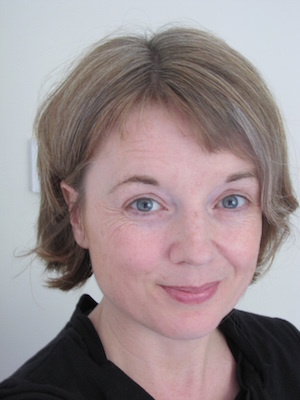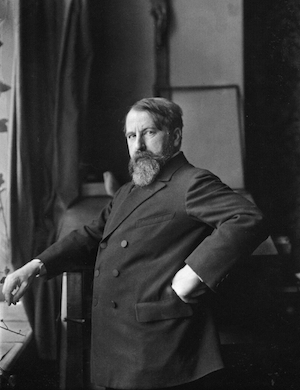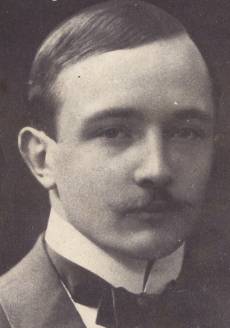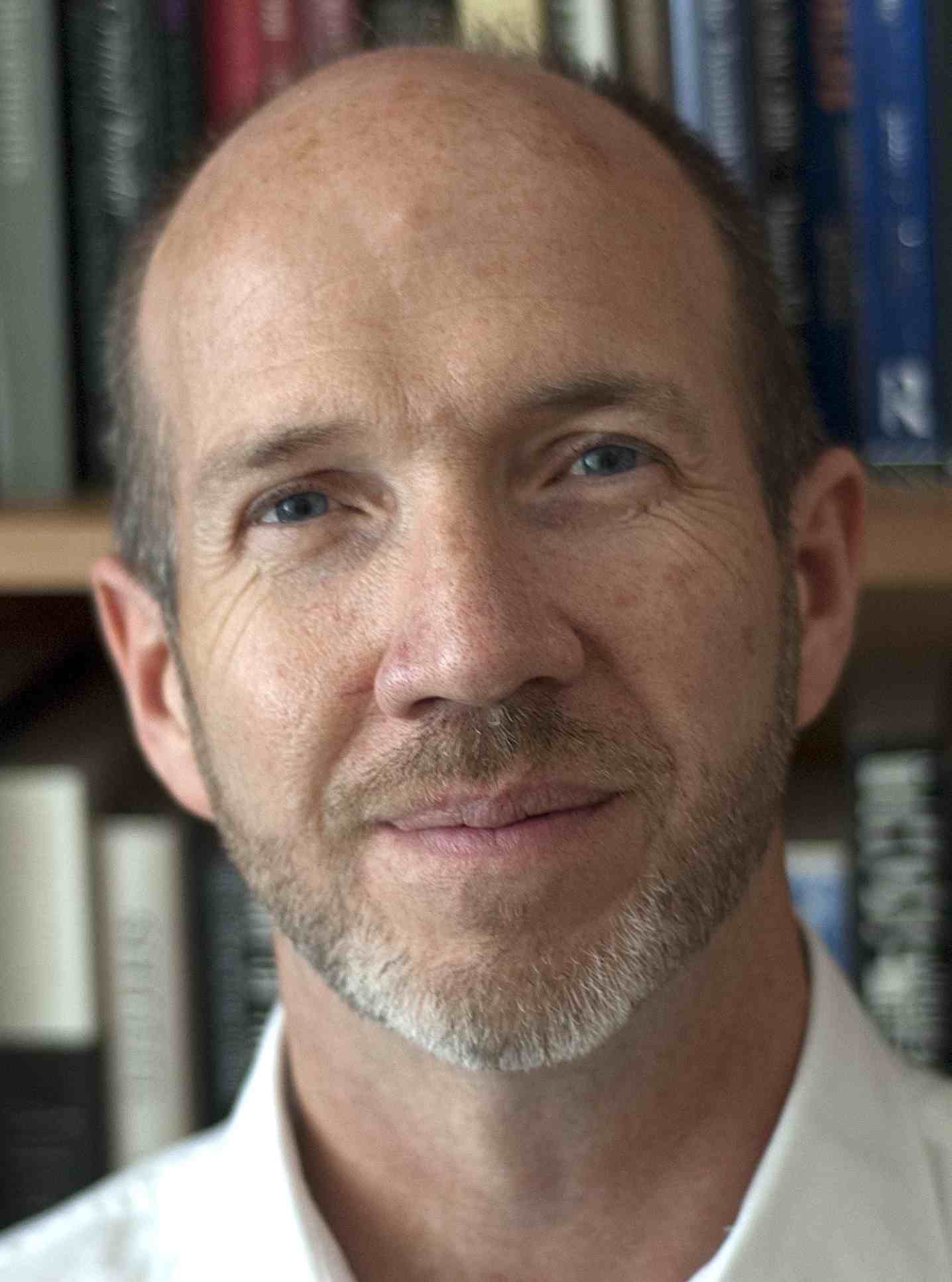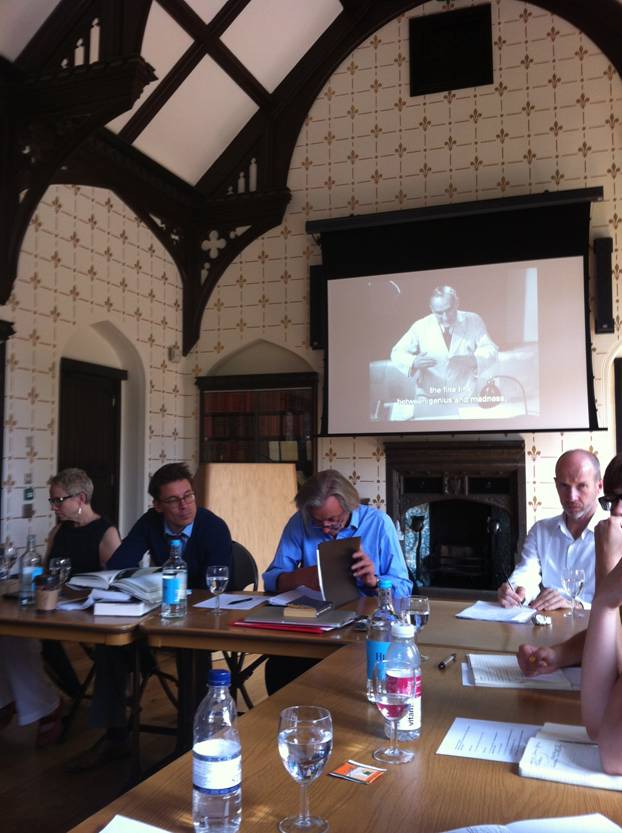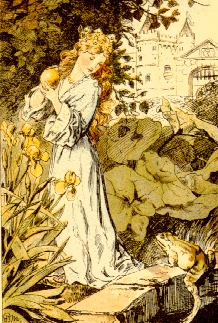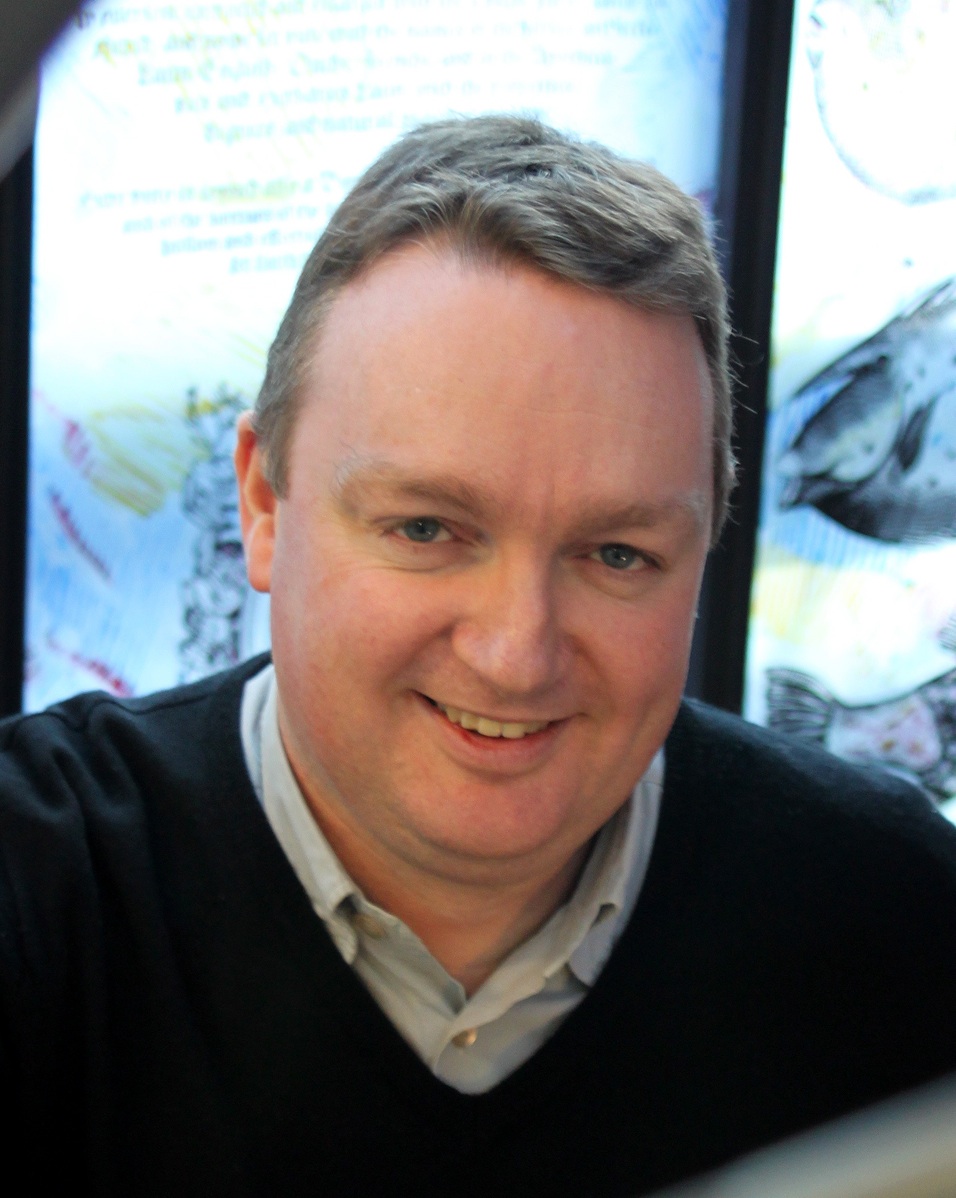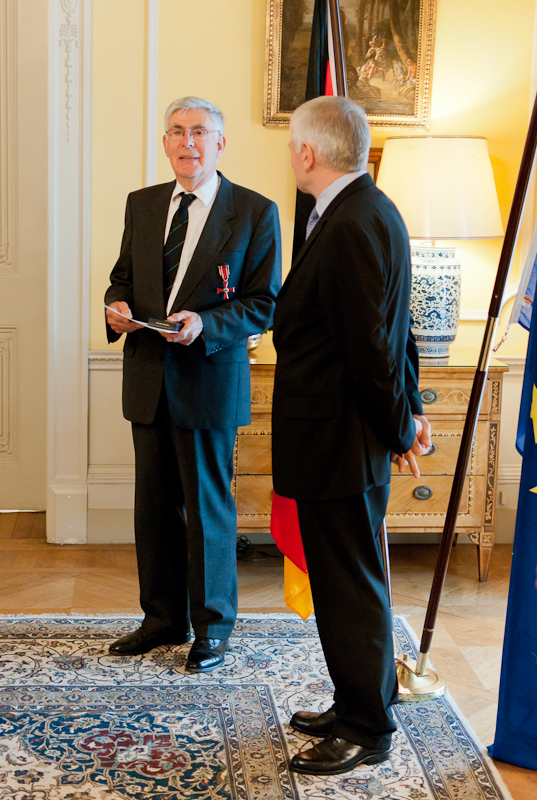News and Events from before 2014-15
Kaiserchronik on the Road

Mark Chinca and Chris Young presented their AHRC-funded Kaiserchronik project with keynote lectures on successive days in Leeds and Liverpool. On Monday 7 July, they gave the opening plenary at the International Medieval Congress at Leeds, which this year took 'Empire' for its theme. The IMC has established itself as an annual event with an attendance of over 1800 medievalists and is Europe's largest gathering in the Humanities. On the following morning, they gave a further plenary at the seventh International Conference on the Medieval Chronicle in Liverpool. Unlike the World Cup, this conference takes place every three years and attracts large participation from around the world.
Gerhard Polt Visiting - Special Presentation
On Tuesday 27 May, the Bavarian film actor, writer and comedian Gerhard Polt was a guest of the Department at a public event in St John’s College. Polt is well known in Germany for his performances in comic films with a satirical edge, and there are many dimensions to his work (see http://www.poltseite.de). In Cambridge presented his latest film, Und Äktschn!, an antidote to Hitler films, which was the subject of a recent interview in Der Spiegel: http://www.spiegel.de/kultur/kino/gerhard-polt-im-interview-ueber-seinen-hitler-film-und-aektschn-a-946071.html
Professor Peter Strohschneider, President of the Deutsche Forschungsgemeinschaft, gave the 2014 D.H. Green Lecture
On Tuesday 20 May, Professor Peter Stohschneider, the President of the Deutsche Forschungsgemeinschaft (DFG – German Research Council) was a guest of the Department. Strohschneider is a distinguished medievalist whose interests and publications extend to the role and purpose of the humanities in general, both within the academy as well as in society at large (seehere). In Cambridge he delivered the D.H. Green Lecture (held annually in memory of Dennis Green, Schröder Professor of German, 1979-1990) on the subject of The Humanities and Society.
Special lecture by Professor Sander L. Gilman: How did Racism and Anti-Semitism become Mental Illnesses? — From Freud’s Vienna to Brown vs. the Board of Education of Topeka, Kansas
On Thursday 22 May, Professor Sander L. Gilman (Distinguished Professor of the Liberal Arts and Sciences, and Professor of Psychiatry, Emory University) gave a special lecture.
In 2012, an interdisciplinary team of scientists at the University of Oxford reported the results of a drug trial, which claimed that a drug could reduce implicit racial bias among its users. Shortly after the experiment, an article in Time Magazine, citing the study, asked the question: Is racism becoming a mental illness? But the idea of racism as a mental illness is much older, having its roots in the genealogies of race and racism as psychopathological categories from mid-19th century Europe and the United States up to today. From the early Zionists to Freud and then from Adorno through Fanon, racism became a mental illness. But what did this imply?
Special Lecture - Undine Zimmer
On Monday, May 5 Undine Zimmer gave a reading at Gonville and Caius College. She read from her book: Nicht von schlechten Eltern - Meine Hartz-IV-Familie (No bad parents – My Hartz-IV Family). Undine Zimmer was born in Berlin in 1979 and studied at the University there. She then worked as a journalist for the German newspaper Die Zeit. In 2012 she was nominated for the Henri-Nannen essay prize. She published her first book in 2013, in which she discusses her childhood in a family living off social welfare.
Second Annual Ludwig Boltzmann Lecture
With the generous support of the Ludwig Boltzmann Institute for the History and Theory of Biography, Vienna, the Ludwig Boltzmann Lecture was given this year by the Karl Kraus expert Dr Deborah Holmes of the University of Kent. Dr Holmes’s subject was ‘War and Words. Krausian “Biographik” in The Last Days of Mankind.
Third David Andrews Lecture: Culture and Conflict, 1914-2014: Reflections in the World War I Centenary Year'
The third David Andrews German Lecture was held on 3rd March, organised by Prof Chris Young from Pembroke College. The talk about 'Culture and Conflict, 1914-2014: Reflections in the World War I Centenary Year', was followed by a panel discussion. It was attended by Ambassador J. Ranau (Chargé d'Affaires, German Embassy), the Director of the DAAD in London, Dr Andreas Hoeschen and enthusiastically received by the audience.
Further funding secured for research on the Corpus of Historical Low German
Sheila Watts is collaborating with Anne Breitbarth (Gent), Véronique Hoste (Gent), George Walkden (Manchester) and Liliane Hægeman (Gent) on a Corpus of Historical Low German (CHLG). The project will create a corpus from a representative selection of texts in Middle Low German, a group of related dialects from Northern Germany from the period 1250–1600. These texts will be tagged for parts of speech and syntactically parsed, following the standards of the Penn Corpora of Historical English. The project has been funded to date by two Newton Trust grants and a British Academy Small Grant. For the next three years (2014–2017) funding will come from a grant of nearly € 400,000 from the Hercules Foundation, a research funding body of the Flemish Government.
Visiting Lecturer: Patrick Bahners from Frankfurter Allgemeine Zeitung
Patrick Bahners, the New York correspondent of the Frankfurter Allgemeine Zeitung, spoke in Cambridge as a guest of the Department of German and Dutch.
Patrick Bahners is well known for his engagement with key issues in German history and the way they are discussed in our time. Among his important publications is the book "Die Panikmacher – Die deutsche Angst vor dem Islam", which appeared in 2011.
The subject of his talk on 14 February was the author Sibylle Lewitscharoff, who won the Georg Büchner Prize in 2013, and her recent novel "Blumenberg" (2011) – a highly entertaining anti-campus novel that engages wittily with the work of the philosopher and cultural theorist Hans Blumenberg.
Jan Wagner Bilingual Poetry Reading
The German writer and poet Jan Wagner came to Caius as part of the DAAD's writer in residence program. His reading was held together with his translator Iain Galbraith.
Jan Wagner, originally from Hamburg, has lived in Berlin since 1995. He studied at Trinity College, Dublin and has translated English poetry into German ever since. He has published seven volumes of poetry and is co-editor of the German modern poetry series Lyrik von Jetzt. He has won 13 literary prizes, including the Anna-Seghers Prize in 2004 and the Friedrich-Hölderlin Prize in 2011.
Iain Galbraith, former MML student of Clare College, Cambridge, is an author and translator. He was born in Glasgow and now lives in Mainz. He has translated into English the poems of Jan Wagner and many others, including Peter Handke and Raoul Schrott. Furthermore, he has translated English poetry of Michael Hamburg, John Burnside and Robert Crawford into German. He is co-editor of ‘Oxford Poets’ and has been awarded the British Centre for Literary Translation Prize and the John Dryden Prize for Literary Translation in 2004.
The New Schröder Professor
Sarah Colvin joined the Department on 1 January 2014 as the new Schröder Professor of German. Prof Colvin studied German language and literature at the Universities of Oxford and Hamburg. Her DPhil in 1995 considered women and Turkish characters in early opera and drama, and a book called The Rhetorical Feminine: Gender and Orient on the German Stage (1999) grew out of that research. She was a postdoctoral research fellow at St John’s College, Oxford, working on women and theatre (Women and German Drama: Playwrights and their Texts, 2003). In 1997 she went to a lectureship at the University of Edinburgh and was appointed to the Eudo C. Mason Chair of German there in 2004. As a Humboldt Fellow at Potsdam University she read texts produced by and about the German journalist-turned-terrorist Ulrike Meinhof; the monograph Ulrike Meinhof and West German Terrorism appeared in 2009. Her current research is on narrative, particularly narratives by prisoners and the use and functions of literary narratives, not only in prisons.
She is Vice-President of the Association for German Studies (AGS).
Centenary of the Beit Donation
On 7 November 2013, the Department celebrated the 100th anniversary of the donation from Sir Otto Beit, one of several endowments around that time that put German studies on a firm footing at Cambridge University for the first time. Sir Otto Beit’s contribution was placed at the disposal of the first Schröder Professor of German, Karl Hermann Breul, for the purchase of books. This was the origin of the German research collection kept in the MML Faculty Library, which we know as the Beit Library. The exceptional historical character of that collection means that it is still an essential resource for research in German studies at Cambridge. We are grateful to the staff of the Faculty Library for ensuring that this event was commemorated with style and panache.
Schnitzler Digital Edition Project
The Department is pleased to announce the start of a major AHRC-funded project to produce a digital critical edition of middle-period works by Arthur Schnitzler, with Prof. Andrew J. Webber as Principal Investigator, and Dr Judith Beniston (UCL) and Prof. Robert Vilain (Bristol) as Co-Investigators. Schnitzler's papers were saved from likely confiscation and destruction in Vienna in 1938 and brought to Cambridge, where the larger part of them is now held in the University Library. The archive includes earlier versions of many published works, and the aim is to make this rich and fascinating resource available to a wide range of users. Alongside open access to the edited works, provided through a digital portal, the findings of the project will be presented through international conferences and workshops, theatre productions and other events, and through publications in book and journal form.
Impact of Idealism Published
The four handsome volumes arising from Prof Nicholas Boyle’s project "The Impact of Idealism: the legacy of post-Kantian German Thought" were published by Cambridge University Press in December 2013. Together they give an impressive account of the complex international legacy of German Idealism in the fields of Philosophy and Science, Historical and Social Thought, Religion, and Literature and Aesthetics. The project, funded by the Leverhulme and Newton Trusts, brought together leading scholars from the UK, Germany and the US. The Department wishes to congratulate Prof Boyle and his team of editors on their monumental achievement, and in particular to thank Liz Disley for co-ordinating this hugely ambitious project with extraordinary efficiency.
Andrew Webber on Radio 3 Nightwaves
Prof. Andrew J. Webber participated in a Radio 3 Nightwaves discussion of Musil’s great Modernist novel, Der Mann ohne Eigenschaften – part of a season marking the anniversary of the outbreak of World War One. The programme, featuring novelists Margaret Drabble and William Boyd, and cultural historian Phillip Blom, can be heard at: BBC iplayer.
Cultures of (In)visibility
In December 2013, three graduates of the University – Annie Ring (Emmanuel College), Henriette Steiner (ETH Zurich) and Kristin Veel (University of Copenhagen) – convened a highly successful and thought-provoking conference with the title “Changing Cultures of (In)visibility” (for details click here). Key speakers were John Daugmann, Hans Ulrich Gumbrecht, Andrew Webber and Emma Wilson, and contributions ranged over such topics as the role of surveillance technology in contemporary society, ethics and (in)visibility, latency and eruption in cultural processes, and the technology of iris recognition for establishing unique identity.
MML School Visit
On 16 October, Silke Mentchen and Cordula Böcking, as Schools Liaison Officer, hosted a visit to the MML Faculty from a large group of pupils from The Fernwood School, Nottinghamshire and their German exchange partners. They were helped by students of the Department of German, among them the Tiarks Junior Scholars. Very positive feedback was received afterwards from Fernwood teacher Matthew Robson: "Thank you so much for organising everything, it was a really fantastic opportunity for the students to see what life at Cambridge is like (and the staff too!) Thank you for your kindness and hospitality." Other groups who would like to visit the Department/Faculty at times outside official Open Days should contact Cordula Böcking. cb758@cam.ac.uk.
2nd Annual Schröder Lecture
On Friday 25 October, Sarah Colvin, the Schröder Professor elect, gave the 2nd Annual Schröder Lecture. Her title was ' "You have to change your life"? The Ethics of Reading and German Studies.' See the abstract here.
Andrew Webber appears on "Who Do You Think You Are?"
Our former Head of Department, Prof. Andrew J. Webber, contributed both on and off screen to a recent episode of the BBC family history programme "Who Do You Think You Are?". The programsssssme starred Marianne Faithfull and investigated her half-Jewish mother's early life as a dancer in 1920's Berlin and her precarious existence in Vienna during World War Two, and also tried to discover whether there is any truth in the rumour that the family was involved with the Austrian Resistance. It can be viewed on YouTube.
Terry Llewellyn
We are sad to announce that Terry Llewellyn, who was a lecturer in the department from 1965 to 2000, passed away on 2 July 2013. His funeral was held on 12 July in Swansea. Those who knew Terry will remember him with fondness.
Two New Professors and a New Reader
Congratulations to three members of the Department who will have new titles from 1 October 2013: David Midgley will be Professor of German Literature and Intellectual History, Joachim Whaley will be Professor of German History and Thought, and Mark Chinca will be Reader in Medieval and Early Modern German Literature.
Mabusefest
On 12 July 2013, a very productive workshop focused on Fritz Lang's classic Das Testatment des Dr. Mabuse was held between teaching and graduate members of the department and visitors from Berkeley (Tony Kaes is pictured, centre-right), also with Erica Carter (pictured, left).
Next Schröder Professor Appointed
Sarah Colvin (currently University of Warwick) has been elected to the Schröder Professorship of German and will take up the post in January 2014. Prof. Colvin studied German language and literature at the Universities of Oxford and Hamburg. Her DPhil in 1995 considered women and Turkish characters in early opera and drama, and a book called The Rhetorical Feminine: Gender and Orient on the German Stage (1999) emerged out of that research. She was a postdoctoral research fellow at St John’s College, Oxford, working on women and theatre (Women and German Drama: Playwrights and their Texts, 2003). In 1997 she went to a lecturership at the University of Edinburgh and became Eudo C. Mason Chair of German there in 2004. As a Humboldt Fellow at Potsdam University she read texts produced by and about the German journalist-turned-terrorist Ulrike Meinhof; the monograph Ulrike Meinhof and West German Terrorism appeared in 2009. Her current research is on narrative, particularly narratives by prisoners and the use and functions of literary narratives, not only in prisons. She is Vice-President of the Association for German Studies (AGS).
D. H. Green Annual Memorial Lecture
This year's lecture will be given by Prof. HaJo Solms (Martin-Luther Universität Halle-Wittenberg) at 5 pm on Friday 17 May, in the Senior Parlour, Magdalene College. The title is 'Zur Grammatik einer nichtnormalisierten Sprachstufe: Das Mittelhochdeutsche' and all are welcome.
Pembroke Student Making Name as Sports Journalist
On the occasion of Wembley Stadium hosting this year’s all-German UEFA Champions League Final, the Berlin newspaper Der Tagesspiegel published an article by Pembroke German student Kit Holden about the highs and lows of being an English supporter of a German football team. Kit has been writing freelance pieces for the newspaper since last summer when he did an internship with them, thanks to an introduction by the Department’s Prof. Chris Young. Kit also appeared on ZDF’s ‘heute journal’ and ‘das aktuelle sportstudio’ in connection with the Wembley final, and he has recently written further sports commentaries for FOCUS Online and The Independent.
Cambridge University's HE+ Project
The Department of German and Dutch is developing a series of modules for a University website created for students who are taking part in its HE+ project across the UK. The subject resources there will help them and general readers discover new interests and develop their academic skills. The Department's first module, "German Literature: the Brothers Grimm and European Fairy Stories", is now live and can be seen here.
Lucia Ruprecht awarded Humboldt Research Fellowship
Congratulations to Lucia Ruprecht, who has been awarded a Humboldt Research Fellowship to work in Berlin during 2013-14. Dr Ruprecht will be working with Prof. Dr. Gabriele Brandstetter at the Institut für Theater- und Tanzwissenschaft at the Free University Berlin. Her project, entitled 'Expression and Authorship in German Literature, Film and Dance c. 1910-1925', will reconstruct the notion of expression (Ausdruck) and its effects on conceptions of authorship across three different media. Engaging with a combination of historical theoretical discourse and artistic practice, it aims to offer refocused readings of a broad range of primary material, and revisions of widely-held assumptions about Expressionism's ideologies.
Martin Ruehl awarded a British Academy Mid-Career Fellowship
Congratulations to Martin Ruehl, who has been awarded a British Academy Mid-Career Fellowship for the academic year 2013-14. Dr Ruehl has provided the following information about the research he will be conducting:
'German philosophers and writers - from Herder and Goethe via Nietzsche and Thomas Mann to Carl Schmitt and Ulrich Beck - have provided some of the most influential formulations of the European idea. For almost all of them, the question of Europe was closely intertwined with the "German question". My research project is a rigorously historical analysis of the changing ways in which German intellectuals conceived of this special relationship in the two hundred-odd years between the end of the Enlightenment and the EU's first constitutional crisis. Using published as well as unpublished sources, I aim to reconstruct the specific German debates in which "Europa" was imagined : as a guarantor for peace and civilization, a vehicle for social and political emancipation, a means for empire-building and the conquest of new markets, and, finally, as the framework for a new "post-national" identity. My goal is to show that despite these transformations, the German idea of Europe was defined by certain constant features, notably the belief in Germany's elevated role and special mission.'
Kaiserchronik Transcription Workshop
Prof. Jürgen Wolf and Prof. Jürg Fleischer from the Universität Marburg joined Mark Chinca and Chris Young in leading the first of their AHRC transcription workshops for graduates. A full report and pictures can be seen here.
Inaugural Annual Schröder Lecture
The Department was delighted to launch a new annual series of lectures devoted to raising the profile of German interests in the University. This marked the re-endowment of the Schröder Professorship through a very generous benefaction from the Schroder Foundation. The inaugural lecture was given on Monday 29 October 2012 by our current Schröder Professor, Nicholas Boyle, on the topic "Goethe's Marriages" and was open to interested parties in the University and outside, being also an event in the programme of the 2012 Festival of Ideas.
Inaugural Boltzmann Lecture
On 19 October 2012, HE the Austrian Ambassador, Dr Emil Brix, delivered a lecture on 'Revisiting fin-de-siècle Vienna' to inaugurate an annual series on Austrian Culture, co-sponsored by the Ludwig Boltzmann Institut für Geschichte und Theorie der Biographie in Vienna.
New Professor and new Reader
Congratulations to Christopher Young, who from 1 October 2012 becomes Professor of Medieval and Modern German Studies, and to Michael Minden, who from the same date becomes Reader in Modern German Literature and Culture.
Major AHRC Award for research on the Kaiserchronik
Mark Chinca and Christopher Young have been awarded funding of c. £950K by the AHRC to produce, with Jürgen Wolf (Marburg), the first ever full edition of the twelfth-century Kaiserchronik. Further details about the project.
Honour for Schröder Professor
Schröder Professor and leading international Goethe expert, Nicholas Boyle, has been honoured by an international conference at NUI Maynooth on the subject of 'Goethe's Faust in Music').
Screening of Der Sturz. Honeckers Ende
On Monday, 21 May, 4.30 pm, Eric Friedler (NDR) will introduce a screening of his 90-minute documentary film Der Sturz. Honeckers Ende. This will be followed by remarks and a discussion with the director. All are welcome.
Venue: Bateman Auditorium, Gonville and Caius College. (Organised jointly with the Modern European History Seminar and the Public and Popular History Seminar.)
Bilingual reading by Jan Brandt
On Thursday, 8 March 2012, in Gonville and Caius College, the German writer (shortlisted for the German Buchpreis) gave a reading from his novel Gegen die Welt.
D. H. Green Memorial Lecture
The first annual D. H. Green Memorial Lecture was given on Friday 2 March 2012 in the Dirac Room, St John’s College. The speaker was Prof. Jens Haustein (Jena) and his topic: Zwischen Geschichte und Mythos: Die Wartburg als Literaturort vom Hochmittelalter bis ins 19. Jahrhundert.
David Wagner visits the Department of German and Dutch
On 9 February 2012, prize-winning writer David Wagner visited the Department and gave a lecture on Berlin and a reading from his novel Meine nachtblaue Hose.
Chris Young wins a Leverhulme Major Research Fellowship
The Department congratulates Chris Young who has been awarded a Leverhulme Major Research Fellowship for the next two academic years during which he will work on his project 'German Sport c. 1920 - c. 1960: Media Entertainment in Four Political Systems'.
New Publication
Joachim Whaley,Germany and the Holy Roman Empire (1493-1806), 2 vols (Oxford: Oxford University Press, 2011)
Germany and the Holy Roman Empireengages with all the major debates among both German and English-speaking historians about early modern German history over the last sixty years and offers a striking new interpretation of this important period. See further details here.
See also a related feature on the Cambridge University research website.
Weltweite Kleist-Lesung
The Department participated in a worldwide series of readings to mark the 200th anniversary of the death of Heinrich von Kleist on Monday 21 November 2011. Members of the Department read a selection of prose and drama pieces in celebration of the work of one of Germany's greatest writers. See the event poster.
Elsa Strietman wins major funding award
The Department congratulates Elsa Strietman, whose collaborative project (with PI, Adrian Armstrong) on 'Transcultural Critical Editing: Vernacular Poetry in the Burgundian Netherlands, 1450-1530' has won a major research grant from the AHRC.
Schröder Professor (Emeritus) Awarded Order of Merit
Congratulations to Prof. Roger C. Paulin who was recently awarded the Bundesverdienstkreuz at a ceremony at the German Embassy in London.
Recent Publication Wins Two Major Prizes
Christopher Young and Kai Schiller,The 1972 Munich Olympics And The Making of Modern Germany, University of California Press (2010)
This publication has won two major awards this year: the annual book award of the North American Society of Sport History - this is the biggest prize in the field, and it is only the third time it has gone out of North America - and the prestigious British award, the Aberdare Literary Prize for Sport History.
The 1972 Munich Olympics-remembered almost exclusively for the devastating terrorist attack on the Israeli team-were intended to showcase the New Germany and replace lingering memories of the Third Reich. That hope was all but obliterated in the early hours of September 5, when gun-wielding Palestinians murdered 11 members of the Israeli team. In the first cultural and political history of the Munich Olympics, Kay Schiller and Christopher Young set these Games into both the context of 1972 and the history of the modern Olympiad. Delving into newly available documents, the authors chronicle the impact of the Munich Games on West German society.
See related feature on the Cambridge University research website.

